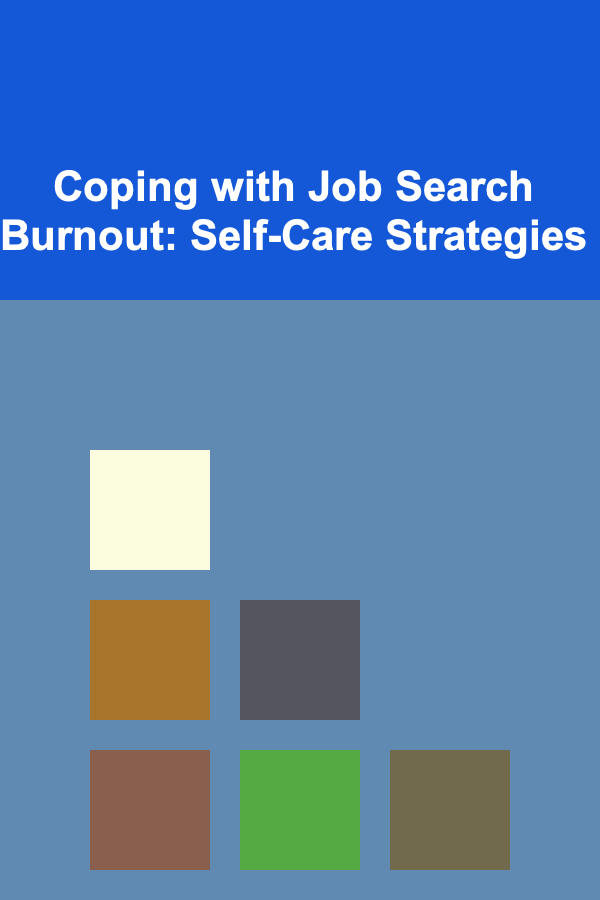
Coping with Job Search Burnout: Self-Care Strategies
ebook include PDF & Audio bundle (Micro Guide)
$12.99$7.99
Limited Time Offer! Order within the next:

Job searching is often considered one of the most stressful life events. While it can be an exciting time of new opportunities and professional growth, it can also lead to feelings of overwhelm, frustration, and burnout. When you're actively applying for jobs, attending interviews, networking, and constantly reviewing your resume, it's easy to find yourself mentally and emotionally drained.
Burnout in a job search can feel like a slow grind, and if not addressed, it can seriously affect your mental health, relationships, and even the effectiveness of your search. In this guide, we will discuss effective self-care strategies to help manage and cope with job search burnout.
Recognizing Job Search Burnout
The first step in addressing burnout is recognizing that it exists. Job search burnout can manifest in various ways, including:
- Exhaustion: Constantly feeling drained, even after a night's sleep.
- Frustration: A growing sense of helplessness as the job search drags on without progress.
- Negative Self-Talk: An increase in self-doubt, thinking you're not good enough or questioning your worth.
- Physical Symptoms: Unexplained headaches, muscle tension, or digestive issues.
- Loss of Motivation: You might find it harder to get excited about new opportunities or to continue applying for jobs.
Once you recognize that burnout is creeping in, it's important to take action. Ignoring burnout can lead to further emotional and physical stress and hinder your ability to approach your job search with the focus and energy required.
Create a Structured Job Search Schedule
One of the leading causes of burnout during the job search process is feeling like the search is never-ending. The anxiety of constantly thinking about job applications, networking, and interviews can create a sense of chaos and helplessness. To counter this, create a structured schedule to regulate your time and tasks.
How to Implement a Structured Schedule:
- Set Daily Job Search Goals: Allocate specific times of day for particular activities, such as applying for jobs, networking, and practicing for interviews. Be realistic about how many applications you can submit in one day.
- Prioritize Tasks: Determine which tasks need your attention most urgently (such as preparing for an interview) and tackle them first.
- Take Breaks: Scheduling short breaks between tasks can help to reset your energy and focus. Don't forget to schedule longer breaks throughout the day to step away from the job search completely.
- Track Progress: Keep a simple journal or use a spreadsheet to track applications, interviews, and follow-ups. This will help you see tangible progress and prevent feelings of stagnation.
Practice Mindfulness and Meditation
Mindfulness and meditation are well-known practices for reducing stress and regaining mental clarity. These techniques can help you manage negative emotions, calm your mind, and foster a sense of control over your situation.
How to Practice Mindfulness:
- Deep Breathing: Focus on your breath and practice slow, deep breaths for a few minutes each day. This can immediately reduce feelings of anxiety and bring a sense of calm.
- Guided Meditation: There are many free guided meditation apps (like Headspace, Calm, or Insight Timer) that can help guide you through meditation sessions to calm your mind.
- Mindful Walking: If sitting still doesn't appeal to you, try taking a walk while practicing mindfulness. Pay attention to the environment around you---the sound of birds, the feel of the breeze, or the colors of nature.
Mindfulness doesn't have to take hours out of your day. Even a few minutes of focused breathing can create significant improvements in your mood and energy levels.
Establish Healthy Boundaries
During the job search process, it can be tempting to work around the clock, always checking for new job postings, constantly networking, or preparing for the next interview. However, this can quickly lead to exhaustion and burnout. It's essential to set clear boundaries between your job search time and personal time.
How to Set Boundaries:
- Turn Off Notifications: Limit the constant influx of job-related emails and messages by turning off notifications or setting a specific time to check emails.
- Set Time Limits: For example, limit your job search to two hours per day, with a dedicated break afterward. Setting a clear "end" to your workday is essential.
- Communicate with Loved Ones: Let your family and friends know your boundaries. This way, they can help support you in respecting your personal time.
By creating a balance between work and rest, you can preserve your energy and focus when engaging with your job search.
Focus on Physical Well-being
Physical health directly influences mental health. When you're feeling burned out from a job search, it's easy to forget to take care of your body. Neglecting your physical health will only exacerbate feelings of fatigue and stress, so it's vital to prioritize exercise, sleep, and nutrition.
Strategies for Physical Self-Care:
- Exercise Regularly: Incorporate physical activity into your routine, even if it's a short walk or light yoga. Exercise boosts endorphins, which helps fight stress and improve mood.
- Get Enough Sleep: Lack of sleep can contribute to feelings of anxiety and stress, making it harder to focus on your job search. Aim for at least 7-8 hours of sleep each night to feel rested and refreshed.
- Eat Well: A balanced diet can help regulate your energy levels and improve focus. Avoid excessive caffeine or sugar, which can lead to energy crashes.
- Stretch and Move: Prolonged periods of sitting while job hunting can cause physical strain. Make it a habit to stand up, stretch, and move around every hour to avoid tension.
Physical well-being creates a foundation for mental clarity, which is essential when tackling a job search.
Seek Emotional Support
Job searching can feel lonely, especially when things aren't progressing as quickly as you would like. It's important to have a support system that you can turn to when you're feeling discouraged or overwhelmed.
Where to Find Support:
- Talk to Friends and Family: Be open with those closest to you about how you're feeling. They can offer encouragement, a listening ear, or even a fresh perspective on your search.
- Join Support Groups: There are many online communities, both general and specific to industries, where job seekers can exchange experiences and advice. These groups can be a great place to vent and receive support from people who understand what you're going through.
- Consider Therapy: If your burnout is significantly affecting your mental health, seeking professional help from a therapist or counselor can be beneficial. They can provide you with coping strategies and emotional support to help you through this challenging time.
Encourage Yourself:
It's easy to fall into self-doubt during a job search. Instead of focusing on the rejections, try to celebrate your progress. Recognize the hard work you're putting in and give yourself credit for your perseverance. Keep a list of small wins, like getting an interview or completing a major application. Reflecting on these successes will help you maintain a positive outlook.
Diversify Your Approach
Sometimes, burnout can stem from feeling stuck in a cycle that's not yielding results. If you've been following the same routine without much progress, it might be time to shake things up a bit.
Ideas for Diversifying Your Job Search:
- Try Different Job Platforms: Explore job boards or career websites that you haven't used before. You might discover opportunities that were previously overlooked.
- Update Your Skills: If you've been applying for jobs without success, it might be time to upskill. Consider taking online courses or certifications in areas relevant to your industry.
- Network in New Ways: Instead of just sending out applications, try reaching out to individuals in your field through social media platforms like LinkedIn or attending webinars and virtual events. Networking can often lead to unexpected opportunities.
By broadening your approach, you can refresh your mindset and possibly uncover new opportunities that weren't on your radar before.
Conclusion
Job search burnout is a common but manageable challenge. By acknowledging the stress you're under and implementing self-care strategies, you can prevent burnout from derailing your efforts and help you stay focused on finding the right job. Remember to structure your time, practice mindfulness, set healthy boundaries, care for your physical well-being, seek emotional support, and diversify your job search efforts.
This is a process, and it's important to be kind to yourself during it. With patience, self-compassion, and consistency, you can manage burnout and keep moving forward toward your career goals.

How to Build a Checklist for Managing Shipping Delays and Unexpected Issues
Read More
How To Choose the Right Wine Glass for Every Varietal
Read More
How to Create a Family Heirloom Inventory
Read More
How to Organize and Auction Your Unused Items Quickly and Efficiently
Read More
Money-Saving Challenges: Creative Ways to Cut Costs and Save More
Read More
The Art of User Interface Design: Best Practices for User-Centered Design
Read MoreOther Products

How to Build a Checklist for Managing Shipping Delays and Unexpected Issues
Read More
How To Choose the Right Wine Glass for Every Varietal
Read More
How to Create a Family Heirloom Inventory
Read More
How to Organize and Auction Your Unused Items Quickly and Efficiently
Read More
Money-Saving Challenges: Creative Ways to Cut Costs and Save More
Read More